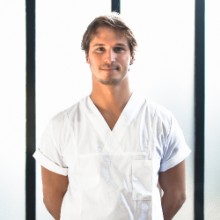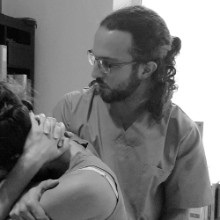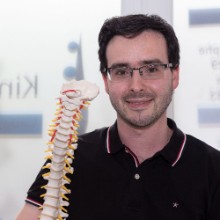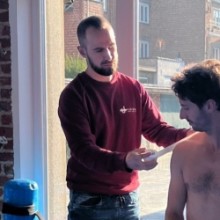What are the next steps if my left knee is still sore 8 weeks after a sprain?
Hi, I think I sprained my left knee. So, I got a knee support from the pharmacy to support recovery. As a self-diagnosis, I have no problems walking, the inner side ligaments seem to be healing better, but even after 8 weeks, the knee still feel sore. I can swim, but not really run and certainly not do any contact sports. It's probably best to finally see a general doctor. After seeing a general doctor, in case it is necessary, what could be the possible next steps to investigate what is wrong with the knee?
- Submitted on 07/07/2024
27 specialists answered
-
Hello,
Given that your knee is still sore after 8 weeks, even without major limitations in walking, it would be wise to consult a general practitioner for an initial assessment. They can perform a clinical examination and, if needed, refer you to an orthopaedic specialist.
Possible next steps may include:
- Imaging: X-ray to check bone integrity, or MRI to assess ligaments, menisci, and cartilage.
- Referral to physiotherapy: To restore mobility, strength, and stability of the knee.
- Specialist follow-up: Orthopaedist or sports medicine physician for targeted treatment options.
In the meantime, avoid hi...gh-impact activities (running, contact sports) and continue low-impact exercises like swimming or cycling, provided they do not cause pain.
Kind regards,
Davide Colasante – D.O. Osteopath Read more
Osteopath | Etterbeek
-
Hello,
Maybe after the GP, take contact with an osteopath to see where the problem is coming from
New Partner |
Osteopath | Soignies
-
Bonjour,
Il vous faut des séances de kinésithérapie, vous vous êtes fait une entorse du genoux Thomas Pagès 9,9
Thomas Pagès 9,9Osteopath | Anderlecht
-
The inner side ligament of the knee DOES NOT heal well spontaneously, every knee sprain MUST be treated by a good physio

New Partner |
Osteopath | Rhode-Saint-Genèse
-
Yes of course, we can check together which structure is touched. You are welcome in my office if you desire. Thank you for your message by the way.
 David Nayis 9,9
David Nayis 9,9Physiotherapist | Nossegem
-
Hello,
You have to see a physical therapist for the next steps, to recover the total mobility and the muscles.
New Partner |
Physiotherapist | Ixelles
-
Hi, You should get in touch with your personal physical therapist so he could deeply assess and investigate you knee.
Good luck.
Job Mabanga, kinésithérapeute Namur. Job Mabanga 9,7
Job Mabanga 9,7Physiotherapist | Namur
-
Hi, the best way to know what is the problem on your knee is to see a specialist doctor of the knee, he will be abble to tell you the better way to cure this problem.
 Hassan Maghfour 9,8
Hassan Maghfour 9,8Physiotherapist | Anderlecht
-
Hello,
You are right, you have to see a doctor to prescrib general exams in a hospital like IRM, radio, ... to see what's going on because there is something but you need specific examens before.
After, you can go to a kinesist to help you.
Kinds regards Christophe Maton 10,0
Christophe Maton 10,0Physiotherapist | Jette
-
Hi, First of all, a joint and ligament clinical assessment should be carried out by an osteopath with the aim of unsealing a cartilage lesion, a joint failure or a ligament and/or tendon lesion of the muscles surrounding the joint. Subsequently, in addition to this clinical assessment, imaging examinations can be carried out to confirm the diagnosis.
 Romain Derue 9,8
Romain Derue 9,8Osteopath | Etterbeek
-
Maybe a IRM ou Rx to see if everything is ok in the knee. After that, you can see a orthopedist specialist of the knee and maybe do some rehab for the knee.
 Coline Adens 10,0
Coline Adens 10,0Physiotherapist | Nivelles
-
Hi. I suggest you to put a cold pack on your knee twice a day 15-20min each time. You must see your GP as soon as possible. It would be helpful to go through a scanner or MRI to check all the different structures of you knee but it's up to your GP to decide.

New Partner |
Physiotherapist | Neder-Over-Heembeek
-
Good evening,
Based on your description, your knee pain sounds like it could be related to a ligament and/or a meniscal issue. Without a real examination, it’s challenging to provide a precise diagnosis. I suggest to take contact with me or to schedule an appointment at one of my offices where I could see you even this week. Following that, I could provide more detailed information and, if needed, refer you to a sports medicine physician for further evaluation. Let me know. Regards ! BD Basile Delcarte 9,7
Basile Delcarte 9,7Ostéopathe et Kinésithérapeute | Watermael-Boitsfort
-
Hello, knee sprain as a diagnosis doesn't mean much... First of all, we need to know the circumstances in which your knee pain appeared, the movements that provoked the pain (going up and down stairs...). Then we need to test the structures involved: ligament? muscle? meniscus? joint? spine? hip? foot? to understand where the pain is coming from.
You can ask your GP for advice 1st if you prefer, or consult an osteopath directly (depending on your preference). We won't know what to do next until you've consulted a doctor and/or osteopath, as it's impossible to know without this 1st step. Max Giacometti 9,8
Max Giacometti 9,8Osteopath | Brussels
-
If your knee has been sore for 8 weeks and hasn't fully healed despite using knee support, it's definitely a good idea to see a general doctor. Here are the possible next steps after seeing the doctor:
1. **Physical Examination**: The doctor will likely start with a physical examination of your knee to assess the range of motion, stability, and specific areas of pain. They might perform specific tests to check for ligament or meniscus injuries.
2. **Imaging Studies**:
- **X-ray**: To rule out any fractures or bone-related issues.
- **MRI (Magnetic Resonance Imaging)**: This is the most effective way to eval...uate soft tissue injuries, such as ligament tears (like ACL or MCL), meniscus tears, or cartilage damage.
3. **Referral to a Specialist**: Based on the initial assessment, your general doctor might refer you to an orthopedic specialist for further evaluation and treatment.
4. **Possible Treatments**:
- **Physical Therapy**: A physical therapist can provide exercises to strengthen the muscles around the knee, improve flexibility, and promote healing.
- **Medications**: Nonsteroidal anti-inflammatory drugs (NSAIDs) might be recommended to reduce pain and inflammation.
- **Bracing or Orthotics**: Depending on the injury, a more specialized knee brace might be recommended to provide better support.
- **Injections**: In some cases, corticosteroid or hyaluronic acid injections might be used to reduce inflammation and pain.
5. **Surgical Options**: If conservative treatments are not effective and the injury is severe (such as a complete ligament tear or a significant meniscus injury), surgery might be considered. This could range from minimally invasive arthroscopy to more extensive reconstructive surgery.
6. **Activity Modifications**: Until a definitive diagnosis and treatment plan are in place, you might need to avoid high-impact activities, such as running and contact sports, to prevent further injury.
It's important to follow through with these steps to ensure proper diagnosis and treatment, which will help in achieving a full recovery. Read more Loic Bullock 9,8
Loic Bullock 9,8Physiotherapist | Gembloux
-
Pain on contraction or stretching, elongation, tear, sensitivity to palpation, limiting contracture, muscle injuries can be diverse and varied with different degrees of injury. An evaluation of your muscle injury and an individualized treatment plan will be developed for optimal recovery. Therapeutic techniques used such as fascial relaxation with dry-needling and cupping promote blood circulation and tissue healing in order to restore musculoskeletal balance.
 Maxime Lambert 9,9
Maxime Lambert 9,9Osteopath | Kraainem
-
Hello. Depending on your symptoms, maybe an MRI or scan will be necessary, or it's also possible than the physical examination will be enough to confirm the diagnosis,without imaging.

New Partner |
Physiotherapist | Berchem-Sainte-Agathe
-
MRI

New Partner |
Physiotherapist | Lasne
-
Hello,
Helping the sprained ligaments to rest seems to be a good idea. Improving the swealing, recover the knee strenght, make it less painfull during the first few month. Then, especially if it's still sore/ instable in 1 month, take an IRM to see what's going on.
Best regards
Thibault Cramesnil Physiotherapist
Physiotherapist | Waterloo
-
First, when you immobilize a limb with a support, it is normal that it get stiff et sometimes sore because of the lack of mouvement. And what is weird is that even if you feel uncomfortable, move your knee, the only limit is pain but discomfort is the limit of stress to tell your knee to what he will have to recover.
Second, a knee is an articulation where you can feel pain super fast even without réel injury but at the same time even if everything is broked it can be perfectly well. The only condition and absolute condition for that is muscle stability. So you NEED muscle for your knee. Doctor are after these 2 step. 1 move to recu...perate a complete range of motion, 2 build muscle to stabilize your knee Read more Joachim De Meur 9,8
Joachim De Meur 9,8Physiotherapist | Jodoigne
-
Hello,
For a better diagnosis (instead of general doctor), you should go directly to see a specialist such as an orthopedist specialized in knee pain.
This specialist may give you some additional test to do, depending of his diagnostic hypothesis. And I hope he also gives you some physiotherapy to strengthen your leg muscles and reduce your pain.
Kind regards Elodie Leroux 9,9
Elodie Leroux 9,9Osteopath | Auderghem
-
Hello. I think it is necessary for you to see a doctor. The doctor will refer you for some tests at the hospital, such as an ultrasound or, preferably, an MRI to confirm a diagnosis of ligament injury with an orthopedist. You should ask the doctor for a prescription for some physiotherapy sessions. The physiotherapist will confirm the diagnosis with some knee test and will help you to recover.

New Partner |
Osteopath | Uccle
-
Hi, I think that in a case like yours it is first necessary to investigate and seek out the causes of the pain either through your GP or, if you are an athlete, through a sports doctor. And it is based on the diagnosis that we can establish a treatment plan or appropriate advice. Now you can also consult an osteopath who will be able to assess your problem and direct you where needed. .
 Stéphane Wemaëre 9,8
Stéphane Wemaëre 9,8Osteopath and Sports Physiotherapist | Waterloo
-
Hello, probably the doctor will ask for an imagery and will give you some physiotherapy sessions.
In that case, you can take an appointment with me and we will see what is the best for you.
Kind regards,
Nathan Dieffembacq
Physiotherapist | Braine-L'Alleud
-
Hello, yes it could be intrusting to do a session of ostéopathy to check de mobility of all the articulations of the leg, because after that kind of trauma you always keep some imbalances in the way you move.
 Victor Sterckx 9,9
Victor Sterckx 9,9Osteopath | Schaerbeek
-
The best is to see a sport doctor
Nicolas Vandenbalck in Delta
He will do what’s necessary
New Partner |
Osteopath | Uccle
-
It would be a good idea to see a sport doctor and do an MRI

Physiotherapist | Uccle
The content provided is strictly informational and should not be considered a replacement for professional advice from doctors or healthcare providers.

Have a question? Ask our specialists
Ask anonymously Ask for free


We’ll email you when a specialist replies.
An unexpected error occurred but we’re working on it. Please try again.

